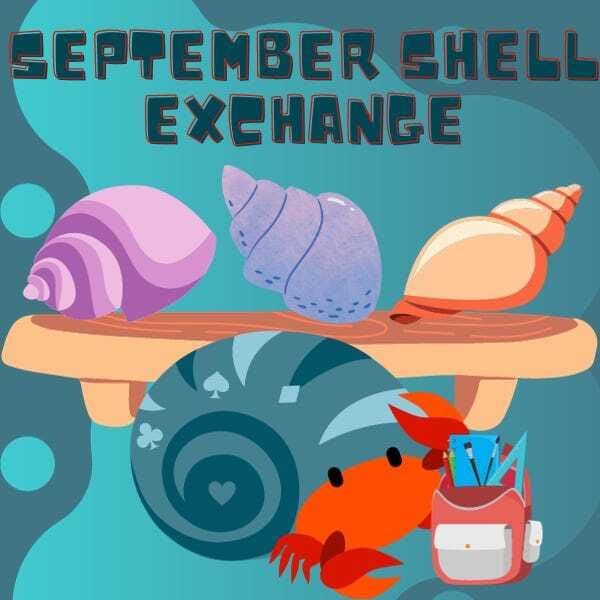
I’m really sorry, but this will be the only post this week. I ended up sick (not COVID—two negative tests—just a nasty cold), and today’s the first day I’ve managed to sit at the computer. (In case you weren’t aware, I usually work on these posts a day or two ahead of time, and it’s currently Thursday) My brain and body aren’t up to more than minimal functioning right now.
I promise to return to normal—or as close as I come—next week.
Welcome to the September 2023 Shell Exchange!
Midway through each month, I drop a list of recommended reads. I try to feature winning hermit crab essays (🦀) when possible. But those charming crabbies aren’t always easy to find. So I also make it a point to share pieces on invisible illness.
If you come across an essay or article I haven’t mentioned that you feel warrants attention, drop the link in the comments, and I’ll add it to the rotation next month.
1. “Having celiac disease and a thyroid condition sent her on a quest to become an empathic doctor” by Isabella Cueto from STAT
“The first pediatric endocrinologist I met with essentially told me — this might sound very crude, but it was our interpretation of it — ‘You’re an unhealthy, fat kid and you need to get it together.’ So that was really hard to deal with.”
2. “My Mother’s Clocks: On Losing Time with Dementia” by Jennifer C. Nash from LitHub
“If you can draw the clock without trouble, if you understand what a circle with numbers inside of it means, you can feel a sense of relief. In the years since that first doctor presented my mother with a blank square of paper, other doctors have asked her some version of the same questions: What is today? Who is the president? How old are you? All of these questions are really the same question: Do you know what time it is?”
3. “The Paradox” by Prachi Gupta from Guernica
“A diagnosis cannot explain why someone’s pain exists, or even guarantee that it can be healed. I swung to the opposite direction, becoming deeply skeptical of psychiatric institutions, for how they defined normative behavior by whatever white Westerners found appropriate. Without acknowledgment that the system we operated in was not meant to support us, a system that would make any person of color at least a little paranoid or angry, a label felt like a way to blame someone for the failing of an entire system.”
4. “The key to depression, obesity, alcoholism—and more? Why the vagus nerve is so exciting to scientists” by Linda Geddes from The Guardian
“Search ‘vagus nerve hacks’ on TikTok, and you’ll be bombarded with tips ranging from humming in a low voice to twisting your neck and rolling your eyes, to practising yoga or meditation exercises.”
5. “The Mystery of Long COVID is Just the Beginning” by Lisa Miller from The Intelligencer
“Spatz and her colleagues were proposing an alternative model: a clinic led by an internal-medicine doctor with a full hour to listen to each patient. This physician would create a treatment plan, communicate extensively with the patient’s primary-care team, and refer out to subspecialists when necessary. It wasn’t glamorous. It might never produce patents or profits or win prizes.”
6. “An uncommon thyroid diagnosis led to an unexpected, all-too-visible side effect” by Isabella Cueto from STAT
“I was 38 at the time, and I have always looked pretty young. And it aged me overnight. It was hard to look in the mirror sometimes and see a person you’ve never seen. And I am not exaggerating when I say that; it really changed my appearance a lot and, in my opinion, in a totally negative way.”
7. “We Have No Drugs to Treat the Deadliest Eating Disorder” by Rachel Gutman-Wei from The Atlantic
“Perhaps some underlying differences in brain chemistry and function play a role in anorexia patients’ extreme aversion to eating. Or perhaps, the experts I spoke with suggested, these brain changes are at least in part a result of patients’ malnourishment.”
8. “Operation Dog” by Elizabeth Jannuzzi from Counterclock
“I can’t remember what the surgeons said as they pulled off their blue caps and gave their post-operation reports to my family in hushed tones. My vivid memories from that time are sensory. The rhythmic whooshing sound of the ventilator machine pumping oxygen into her lungs. Her tangy body odor after weeks of only sponge baths. The contrast between the gray waiting room walls and the magnificent red and yellow autumnal display outside its windows.”
9. “‘Not sick enough’ How insurance denials can delay lifesaving eating-disorder treatment” by Hannah Furfaro from Seattle Times
“Medin had lost 12 pounds in two months. But she wasn’t thin enough — she hadn’t starved herself enough, purged enough — to get the treatment recommended by her doctor, her Medicaid plan determined.”
10. “A Story About Pain” by Aubrey Hirsch from The Audacity 🦀
“A ruptured eardrum isn’t a life-threatening issue, but the systematic dismissal of women’s pain literally can be.”
11. “Long Covid is a new name for an old syndrome” by Steven Phillips and Michelle A. Williams from STAT
“Long Covid is a new term coined for an old syndrome that has long bedeviled the ecosystem of clinicians, researchers, patients, support groups, and health care systems. It’s a unifying hypothesis that explains most observed facts around the striking lack of inroads against long Covid.”

